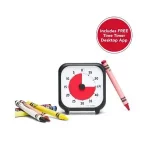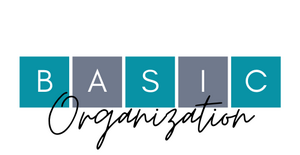Journaling
Journaling
Our brain is a powerful tool. But sometimes it seems to get full and overwhelmed. I keep a pad of paper on my nightstand for those nights that this happens to me. I don’t want to miss my next “brilliant idea”! Journaling is a great way of getting things off your mind and down on paper.
5 things to Write in Your Journal
Wins
Recognize and capture your achievements. It’s OK to pat yourself on the back.
Ideas
Don’t let them escape. Make them tangible and doable.
Goals
Check on their status. Touch base with yourself by writing down your progress.
Fears
Minimize what keeps you up at night, by writing them down.
Lessons
Pay attention to the new information you encounter, so you can recall it later.
Journaling is a great way of getting things off your mind and down on paper. 5 things to write in your journal. Click To TweetJournaling helps you understand your thoughts and feelings. It also can help with your mental health.
The Time Timer
 Give the Gift of (Visual) Time
Give the Gift of (Visual) Time
Whether your children are learning at home in the classroom or both, the time timer products can help ensure they have the tools to succeed. Discover how you can reduce resistance to routines and increase time management skills.
Unlike traditional timers that fail to make the abstract concept of time concrete, the award-winning Time Timer’s visual depiction of “time remaining” provides stress-free time management at work, school, and home to make every moment count.
Special needs individuals: There’s a world of difference between looking at a clock and being able to say that it’s 3 o’clock and understanding “how long” 5 minutes is. For those who learn differently, this type of abstract thinking is even more difficult and often creates a high level of anxiety.
Education: Teachers around the world have discovered the power of the award-winning Time Timer to transform stressful transition periods, reduce resistance to routines and increase their ability to manage their classrooms.
Home: You know what a difference the Time Timer makes in the classroom, but what about at home? Discover the power of the award-winning Time Timer to transform never-ending meals, stressful transition periods, and resistance to routines.
Work: At your desk, in the boardroom, or on the wall of the conference hall, the Time Timer increases productivity by creating a sense of urgency and keeping everyone on track.
Subscribe by email
Enter your email address to subscribe to this blog and receive notifications of new posts by email.
Janet Schiesl

Janet has been organizing since 2005. She is a Certified Professional Organizer and the owner of Basic Organization.
She loves using her background as a space planner to challenge her clients to look at their space differently. She leads the team in large projects and works one-on-one with clients to help the process move quickly and comfortably. Call her crazy, but she loves to work with paper, to purge what is not needed and to create filing systems that work for each individual client.
Janet is a Past Board Member of the National Association of Productivity and Organizing Professionals and a Past President of the Washington DC Chapter of NAPO were she has been named Organizer of the Year and Volunteer of the Year.



Janet Schiesl
Janet has been organizing since 2005. She is a Certified Professional Organizer and the owner of Basic Organization.
She loves using her background as a space planner to challenge her clients to look at their space differently. She leads the team in large projects and works one-on-one with clients to help the process move quickly and comfortably. Call her crazy, but she loves to work with paper, to purge what is not needed and to create filing systems that work for each individual client.
Janet is a Past Board Member of the National Association of Productivity and Organizing Professionals and a Past President of the Washington DC Chapter of NAPO were she has been named Organizer of the Year and Volunteer of the Year.

I keep a prayer journal. Originally it was just to track prayer requests and how they turned out. Over time, I have found it a handy place to jot down thoughts, worries, concerns, dates, and other things. The best part of journals is looking back on them and seeing what was on my mind in the past. So many people have found journaling to be a helpful discipline. Plus, the books themselves are so much fun! My daughter does bullet journaling, and they are as much artistic expression as a place to gather data.
I agree that they can turn into so much more depending on what you need in your life. Looking back can be a great way to track mindset and help for the future, too.
I am encouraging a client to journal how she feels at certain times during the days as she is starting on a new medicine for ADHD. When we have a session, I add my input as to ability to focus and make decisions.
Sounds like a great combination!
I’ve always been terrible about developing a journaling practice, which is ironic considering how much I love writing. I’ve tried journaling for the past 40 years or so, and I don’t think I’ve ever kept it up for more than a week. (I generally avoid continuing with anything where I have only failures. I find I just don’t enjoy journaling because I’m already very clear about my thoughts.) I do write letters and long emails daily, and I think it hits many of the same goals you’ve identified. Between those letters and my email round-robin with my mastermind group, I definitely log my wins, ideas, goals, and lessons. I’m probably (like most people) less likely share my fears, but I’ll work on that.
Thanks for the reminder of the importance of journaling for capturing errant brain patterns.
It sounds like you do journaling, just a little bit different. Letters and emails achieve the same goal, certainly.
I love journaling. I write in mine almost every morning. I put down my intention for the day and any notes about the wins of the day before. I love looking back and reading about my journey through the days.
A great way to start the day!
Ahhh. Journaling! I love writing, be it on the computer or by hand. Currently, I have two journals. One is my daily meditation journal, where I note the meditation practice, teacher, and post-meditation thoughts. The other is my personal journal. I’ve been journaling since I was 12. I don’t write in it every day, but more when I feel the desire to capture a moment in time (positive or negative.) It’s a great place to record wins, work out challenges, and have a casual record of how life is unfolding.
One of my favorite things to do is bring my journal when traveling. I love to re-read old entries, better understand what has transpired (challenges faced and overcome), and note what’s happening right now.
What a great idea to separate them and have 2 journals for the different focuses.